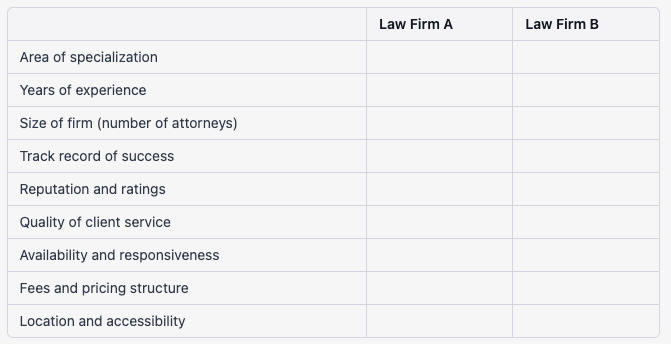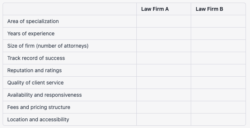How To Choose a Law Firm For Your Injury Lawsuit, Class Action or Mass Tort Case
Here are some common questions that people often ask when hiring personal injury or mass tort law firms:

- What is the firm's track record of success in cases like mine?
- Are the attorneys at the firm experienced in handling personal injury or mass tort cases?
- How much do the attorneys at the firm charge, and what is the firm's billing structure?
- How will the firm keep me informed about the progress of my case?
- What is the firm's approach to negotiating settlements and going to trial?
- Can the firm provide references or testimonials from other clients who have been satisfied with their services?
- How does the firm handle communication and client service?
- Is the firm conveniently located and accessible?
These questions are not included in the comparison matrix provided earlier, as they are focused on more specific aspects of the law firm and its services. By asking these questions and seeking answers from the law firms that you are considering, you can gain a better understanding of the firm's experience, approach, and client service, and make an informed decision about which firm is the best fit for your needs.
What are some pitfalls to watch out for in a lawyer engagement contract?
There are several potential pitfalls to watch out for in a lawyer engagement contract for personal injury claims. Some common pitfalls include:
- Unclear or ambiguous language: The contract should be written in clear and concise language that is easy to understand. Avoid contracts with vague or ambiguous terms that could be open to interpretation or leave room for misunderstandings.
- Unreasonable fees or billing practices: Be wary of contracts that include high fees or billing practices that are not transparent or fair. For example, some contracts may include hidden fees, such as administrative or overhead costs, that are not clearly disclosed.
- Limited scope of services: Some contracts may limit the scope of services that the lawyer will provide, which could impact the quality of representation and the outcome of your case. Make sure the contract clearly outlines the services that the lawyer will provide, and that these services are sufficient to meet your needs.
- Unfavorable dispute resolution provisions: Be careful of contracts that include dispute resolution provisions that are not favorable to you. For example, some contracts may require you to waive your right to a trial by jury or to participate in arbitration or mediation, which could limit your ability to seek justice and compensation.
- Unfair termination clauses: Be cautious of contracts that include termination clauses that are not fair or reasonable. For example, some contracts may allow the lawyer to terminate the contract at any time, without cause, which could leave you without representation and vulnerable to losing your case.
By carefully reviewing the contract and watching out for these potential pitfalls, you can protect your rights and interests and ensure that you receive the best possible representation for your personal injury claim.
What is a contingency fee and how do they work?
Contingency fee structures are commonplace throughout the legal industry. If you have never heard of this term, it basically means that the lawyer offering you services will only charge a fee if your claim is successful. Therefore, the fee itself is "contingent" on victory.
Contingent fees allow for greater flexibility, as most people do not have the liquid assets needed to pay a lawyer upfront. Although you cannot get out of paying if you win the case, lawyers who offer contingent fee structures will not cost you anything if you lose.
Why do some law firms charge 40% and others only charge 20%?
The percentage of fees that a law firm charges for personal injury or mass tort cases can vary for a number of reasons. Some factors that may affect the percentage of fees that a law firm charges include:
- The firm's experience and reputation: Law firms with more experience and a strong reputation may charge higher fees, as they may have a track record of success and be able to provide high-quality representation.
- The complexity of the case: Cases that are more complex, such as those involving multiple parties or significant damages, may require more time and resources, and may therefore be subject to higher fees.
- The location of the firm: Law firms in larger cities or areas with higher costs of living may charge higher fees to cover their overhead expenses.
- The firm's billing structure: Some law firms may charge a higher percentage of fees, but offer more flexible or transparent billing practices, such as contingency fees or flat fees.
Overall, the percentage of fees that a law firm charges can vary depending on a number of factors, and it is important to carefully review the terms of the contract and compare fees from different firms before making a decision.
How long does it take to get a settlement from a lawsuit? Is it worth filing one if it takes so long? are there ways to get money sooner?
The length of time it takes to get a settlement from a lawsuit can vary depending on a number of factors, such as the complexity of the case, the availability of evidence and witnesses, and the responsiveness of the defendant. In general, personal injury and mass tort cases can take several months or even years to resolve, depending on the specific circumstances of the case.
Whether it is worth filing a lawsuit can depend on a number of factors, including the severity of the injury, the likelihood of success, and the potential damages that can be recovered. In some cases, the benefits of pursuing a lawsuit, such as the possibility of obtaining compensation for medical expenses and other damages, may outweigh the time and effort involved. In other cases, alternative dispute resolution methods, such as mediation or arbitration, may be more appropriate.
There are some ways to get money sooner in a personal injury or mass tort case. For example, some law firms may offer advances or loans to help clients cover their immediate expenses, such as medical bills or lost wages. In addition, some defendants may be willing to negotiate a settlement or make an early payment to avoid the time and expense of a lawsuit. However, it is important to carefully consider these options and consult with an attorney before making a decision.
Can I represent myself or do I need to hire an attorney?
In personal injury and mass tort cases, it is generally advisable to hire an attorney to represent you. Personal injury and mass tort cases can be complex, and an experienced attorney can provide valuable legal advice and representation to help you pursue your claim and maximize your chances of success.
While it is technically possible for an individual to represent themselves in a personal injury or mass tort case, this is generally not recommended. Personal injury and mass tort cases involve complex legal issues and procedures, and representing oneself can be challenging and risky. An attorney can provide valuable knowledge and expertise, and can help you navigate the legal system and protect your rights and interests.
In some cases, it may be necessary to hire an attorney, as some courts or judges may require that you have legal representation in order to proceed with your case. In other cases, even if it is not strictly required, hiring an attorney can be beneficial, as it can help you avoid mistakes and pitfalls, and increase your chances of obtaining a favorable outcome.
What are other questions people ask before hiring a personal injury attorney?
In addition to the questions discussed earlier, people may ask a variety of other questions before hiring a personal injury attorney. Some common questions that people may ask include:
- What is the attorney's experience and specialization in personal injury cases?
- How many personal injury cases has the attorney handled, and what were the outcomes?
- Does the attorney have any particular expertise or knowledge in the type of personal injury case that I have?
- What is the attorney's approach to handling personal injury cases?
- How does the attorney communicate with clients and keep them informed about the progress of their case?
- What is the attorney's track record of success in personal injury cases?
- What is the attorney's fee structure, and what is included in the fees?
- Can the attorney provide references or testimonials from other clients?
- Does the attorney have any disciplinary history or negative feedback from clients or peers?
By asking these questions and seeking answers from the attorney, you can gain a better understanding of the attorney's experience and approach, and make an informed decision about whether the attorney is the right fit for your case.
What are 5 good resources to check to find good information about hiring attorneys?
There are many good resources that you can use to find information about hiring attorneys for personal injury and mass tort cases. Some useful resources include:
- Lawyer directories: Lawyer directories, such as the American Bar Association's (ABA) lawyer directory, can provide information about attorneys, including their practice areas, experience, and contact information.
- Law firm websites: Many law firms have websites that provide detailed information about the firm's attorneys and their experience and approach to handling personal injury and mass tort cases.
- Client reviews and ratings: Websites such as Avvo and Martindale-Hubbell provide ratings and reviews from clients and other attorneys, which can provide insight into the attorney's reputation and quality of service.
- Professional organizations: Professional organizations, such as the American Association for Justice (AAJ) or the American Board of Trial Advocates (ABOTA), can provide information about attorneys who are members of the organization and have demonstrated expertise in personal injury and mass tort cases.
- Legal publications and websites: Legal publications and websites, such as the ABA Journal or LegalZoom, can provide articles and information about personal injury and mass tort cases, and can also include directories of attorneys and legal resources.
By using these resources, you can gather information about attorneys and their experience and reputation, and make an informed decision about which attorney is the best fit for your needs.
Here is an example of a comparison matrix that you could use to compare law firms:

To use this matrix, follow these steps:
- Start by reviewing the list of questions in the matrix. These questions are designed to help you compare law firms on various dimensions, such as specialization, experience, reputation, and client service.
- Consider the specific needs and goals of your case, and think about which aspects of a law firm are most important to you. This will help you prioritize the questions and focus on the areas that matter most to you.
- Research each law firm that you are considering. Look for information on their websites, read reviews and testimonials from other clients, and talk to the attorneys at the firm to learn more about their experience and approach.
- As you gather information about each law firm, fill out the comparison matrix with the relevant details. You can use the matrix to compare the firms side-by-side and see how they stack up against each other.
- Use the completed matrix as a tool to help you make an informed decision. Consider the answers to the questions and the overall strengths and weaknesses of each law firm. You can also use the matrix to compare the firms to your own priorities and goals, and to see which firm is the best fit for your case.
I hope this helps! Let me know if you have any other questions.



